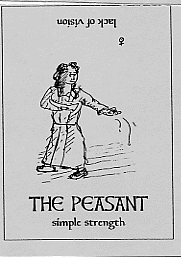 |
|
 |
||||||
Religion: |
||||||
Christianity has taken the Jewish concept of the tribe, the chosen people, and turned it into the "body of Christ," the corps of believers. Christianity and Judaism each have an in-crowd, which is seen as more holy, more righteous, and more theologically correct, held in special esteem by God Himself. In the case of Judaism, membership in the in-crowd is hereditary (through the mother). You can see this tribalism, for example, in the story of Samson or in Passover, which commemorates a night of genocidal terrorism. It's not that the Hebrews were any more racist than anyone else. Indeed, their laws were notably generous in dealing with outsiders. Still, they were racist in way that was commonplace then and disturbing now. In the case of Christianity, however, membership in the "tribe" is not hereditary but voluntary. Christianity's in-crowd is more broad-minded and egalitarian than Judaism's. Everybody is welcome into the in-crowd. Nobody is outside of God's grace by fault of birth. That's the point of the story of the Good Samaritan, or of the Roman whose servant Jesus healed. Remember the Ethiopian Jews whose identity as Jews was questioned? Christianity, in contrast to Judaism, adores converts. But Christianity's new take on "God's favorite tribe" is also more violent. It implies that those who are not members of the in-group have rejected membership in God's special club. Outsiders are not merely different and unrighteous, they are enemies. They are apostates, heretics, schismatists, heathens, pagans, unbelievers, idolaters, slaves to Satan's false teachings. Christians have hated others for not becoming Christian in a way that Jews have not hated others for not being born Jewish. Ironically, it is the Christian idea of the in-group, learned from Judaism, that promotes anti-Semitism in Christian countries. Since Jews won't join the in-group, they are persecuted. Jews, for example, were the chief victims of Torquemada's Inquisition. Islam does basically the same thing as Christianity. Thus, the conquest of neighboring lands. Thus, the talk of infidels and the Great Satan. Thus the anti-Semitism. —JoT DragonRaid: A striking example of the Christian attitude toward outsiders, an RPG from the 80s. Update: In his book The Clash of Civilizations, Samuel P. Huntington voiced a similar analysis of how Christianity and Islam are alike. He cites the religions' us-and-them attitude in combination with their claim to universality. top |
||||||